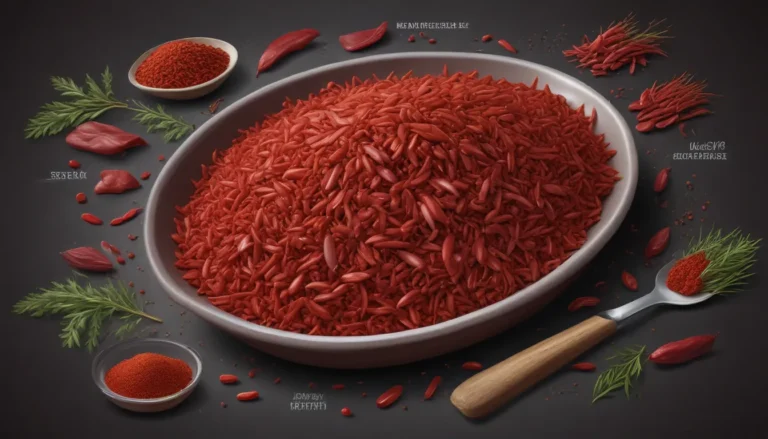The pictures in our articles might not always show exactly what the text is talking about. We use these images to make the article more interesting and eye-catching. They are there to add to the text, but not to replace it or show every detail.
Corned beef has been a beloved protein choice for centuries, offering a unique taste and texture that sets it apart from other meats. Whether it's enjoyed in a classic Reuben sandwich or as a savory addition to breakfast hash, corned beef provides a delicious and satisfying eating experience. But beyond its mouthwatering flavor, corned beef also offers several nutritional benefits that are worth exploring. In this article, we will delve into 20 key nutrition facts about corned beef to help you understand how it can fit into a healthy and balanced diet. From its protein content to its vitamin and mineral profile, corned beef has a lot to offer in terms of nutrition. So, let's explore the nutritional value of this versatile and tasty meat!
The Nutritional Value of Corned Beef
When it comes to corned beef, there are key takeaways to keep in mind. While it is high in protein, vitamins, and minerals, it is essential to be cautious of its high sodium and calorie content. Enjoying corned beef in moderation and balancing it with other healthy foods can help create a tasty and nutritious meal. Additionally, corned beef is a versatile, gluten-free option with a long shelf life, making it a convenient and delicious choice for any meal.
The Benefits of Corned Beef
High in Protein
Corned beef is a rich source of protein, providing approximately 27 grams per 100-gram serving. Protein is crucial for building and repairing tissues, promoting muscle growth, and maintaining a healthy immune system.
Rich in Vitamins and Minerals
Corned beef contains a variety of essential nutrients, including vitamin B12, niacin, zinc, and selenium. These nutrients play vital roles in energy production, DNA synthesis, immune function, and overall health.
Contains Healthy Fats
Contrary to popular belief, corned beef contains healthy fats, such as monounsaturated and polyunsaturated fats, which can help reduce inflammation and improve heart health when consumed in moderation.
Good Source of Iron
Corned beef is a great source of iron, an essential mineral for oxygen transport in the body. Iron deficiency can lead to fatigue, weakness, and impaired cognitive function.
Contains Essential Amino Acids
As a complete protein, corned beef provides all the essential amino acids needed for various physiological processes, including muscle growth, tissue repair, and hormone synthesis.
Contains Vitamin B12
Vitamin B12, found in corned beef, plays a crucial role in the formation of red blood cells, neurological function, and DNA synthesis.
Good Source of Zinc
Zinc, an essential mineral present in corned beef, is important for immune function, wound healing, and DNA synthesis.
Provides B Vitamins
Corned beef is rich in B vitamins, including niacin, thiamin, riboflavin, and pantothenic acid, which are essential for energy metabolism, nerve function, and the production of red blood cells.
Considerations When Consuming Corned Beef
High in Sodium
Corned beef is known for its high sodium content, which can increase the risk of high blood pressure and other cardiovascular diseases. It is crucial to consume corned beef in moderation and balance it with low-sodium food choices.
High in Calories
Corned beef is relatively high in calories, with approximately 251 calories per 100-gram serving. Therefore, it is important to consume it in moderation and balance it with other nutrient-dense foods.
Contains Selenium
Corned beef contains selenium, a powerful antioxidant that helps protect cells from damage caused by free radicals and supports thyroid function and immune health.
Source of Potassium
Despite its high sodium content, corned beef also provides potassium, a mineral that helps maintain fluid balance, regulate blood pressure, and support proper muscle and nerve function.
Contains Phosphorus
Corned beef is a good source of phosphorus, which is important for bone health, energy production, and cell repair.
Provides Essential Omega-3 Fatty Acids
Corned beef contains small amounts of omega-3 fatty acids, which have been associated with various health benefits, including reducing inflammation and improving heart health.
Cooking and Enjoying Corned Beef
Various Cooking Methods
Corned beef can be prepared using different cooking methods, such as boiling, braising, slow cooking, or grilling, each imparting a unique flavor and texture to the meat.
Convenient and Versatile
Corned beef is a popular choice for sandwiches, stews, casseroles, and breakfast dishes like hash. Its versatility makes it a convenient option for various meal preparations.
Long Shelf Life
When properly stored, corned beef has a long shelf life, making it a practical choice for stocking up in the pantry or for emergency food supplies.
Traditional Irish Dish
Corned beef has a rich history as a traditional Irish dish, often enjoyed on St. Patrick's Day. It gained popularity among Irish immigrants in the United States and eventually became a global favorite.
Enjoyed Year-Round
While corned beef is commonly associated with St. Patrick's Day, it can be enjoyed year-round as a delicious and satisfying meal option.
Conclusion: Moderation is Key
In conclusion, corned beef offers a variety of nutrients that can be beneficial when consumed as part of a balanced diet. While it provides essential vitamins and minerals, such as iron, zinc, and B12, it is also important to be mindful of its high fat and sodium content. Moderate consumption of corned beef and pairing it with a variety of vegetables and whole grains can help create a well-rounded and nutritious meal.
Frequently Asked Questions
-
Is corned beef a healthy choice?
Corned beef can be part of a healthy diet when consumed in moderation, as it offers valuable nutrients such as iron, zinc, and vitamin B12. -
Are there any health benefits to eating corned beef?
Yes, corned beef provides essential nutrients that support healthy blood cells, immune function, and energy production. -
Should I be concerned about the fat content in corned beef?
While corned beef can be higher in fat content, choosing leaner cuts can help reduce your intake of saturated fat. -
How can I reduce the sodium content in corned beef?
Rinsing the meat before cooking can help reduce the sodium content in corned beef. -
Can corned beef be part of a balanced diet?
Yes, pairing corned beef with a variety of vegetables and whole grains can help create a balanced meal that provides a wide range of nutrients.
Thank you for exploring the nutritional value of corned beef with us. Each fact on our site is contributed by real users like you, ensuring a wealth of diverse insights and information. Our commitment to quality and authenticity guarantees that the facts we share are not only fascinating but also credible. Trust in our dedication to delivering trustworthy and engaging content as you continue to explore and learn with us.






